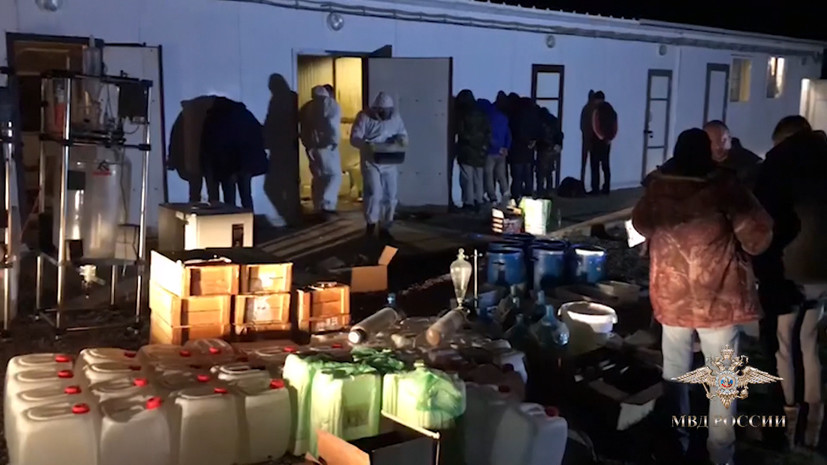In the Serpukhov district of the Moscow region, law enforcement officers thwarted the activities of the largest underground laboratory for the production of synthetic drugs in recent years, the official representative of the Russian Ministry of Internal Affairs, Irina Volk. According to her, the operation was carried out by employees of the Main Directorate for Drug Control and metropolitan operatives.
Production workshops were located on the premises of a former farm with an area of more than 4 hectares. In two rooms, chemical reactors worth 200 thousand to 500 thousand rubles each, as well as a warehouse with chemical reagents, were discovered. According to the Ministry of Internal Affairs, about 1.5 tons of synthetic drugs were produced in the laboratory during the month.
“In total, more than 100 kilograms of narcotic drugs in crystallized form, 1.5 tons in liquid state, four tons of chemicals, over 600 kilograms of precursors, seven chemical reactors, and various laboratory equipment were seized from illegal trafficking,” Volk said.
As a result of the police operation, three chemical technologists, citizens of Ukraine, a courier, as well as the alleged organizer of an illegal business, were detained. A criminal case has been opened on the grounds of a crime stipulated by part 3 of article 30 (attempted crime) and part 5 of article 228.1 of the Criminal Code of the Russian Federation (illegal production and sale of drugs by an organized group on an especially large scale). All detainees were detained.
“This group acted according to a clearly organized criminal scheme - from the production of drugs to their sale. Sales were carried out through an online store located in the shadow segment of the Internet, ”the official representative of the Ministry of Internal Affairs explained.
In addition, law enforcement authorities stopped 18 drug deliveries to the Novosibirsk, Tver, Vladimir, Kursk, Kaluga, Arkhangelsk regions, the Republic of Tatarstan and Buryatia, Khabarovsk and Primorsky Territories. They also managed to liquidate retail drug distribution networks in four regions of Russia.
- The largest drug laboratory in recent years has been eliminated in Serpukhov district of the Moscow region
Recall, on the eve of the Moscow Region FSB officers also eliminated the drug laboratory created by the citizens of the Russian Federation and Ukraine. According to TASS, this illegal enterprise was located in another district of the Moscow region.
Employees of the Federal Security Service seized more than 41 kg of prohibited substances, at least 500 liters of drug-containing liquid, as well as laboratory equipment and chemical reagents. Three drug dealers were detained, a criminal case was instituted in the same way under Part 5 of Art. 228.1 of the Criminal Code.
In addition, on November 13, the FSB stopped the activities of one of the largest online drug stores in Russia. On the territory of the Tver, Voronezh, Moscow, Novosibirsk, Omsk, Orenburg, Saratov, Tyumen, Tomsk and Chelyabinsk regions, special services seized 440 kg of drugs, the cost of which is estimated at 650 million rubles.
“During their transportation and marketing seven employees of one of the largest illegal online stores, performing the functions of inter-regional and regional couriers in it, were detained red-handed,” the department explained.
All detainees were arrested; seven criminal cases were instituted against them on the grounds of crimes under Part 5 of Art. 228.1 of the Criminal Code.
Recall that at the end of October, Russian President Vladimir Putin instructed the government to amend the law to criminalize drug propaganda on the Internet. At the moment, penalties are provided for such violations - up to 5 thousand rubles for individuals, up to 1 million rubles for legal entities.
The Ministry of Internal Affairs of Russia has already begun to carry out the instructions of the head of state. The agency posted on the federal portal of draft regulatory legal acts the corresponding legislative initiative, which is currently at the stage of public discussion.
In the rationale for the document, it is noted that drugs are actively promoted on the Internet, as a result of which new people are involved in illegal activities and a steady demand for illicit substances is created.
“In connection with the foregoing, it is proposed to establish criminal liability for inducing the consumption or promotion of narcotic drugs, psychotropic substances or their analogues using the Internet information and telecommunication network,” the draft law says.

